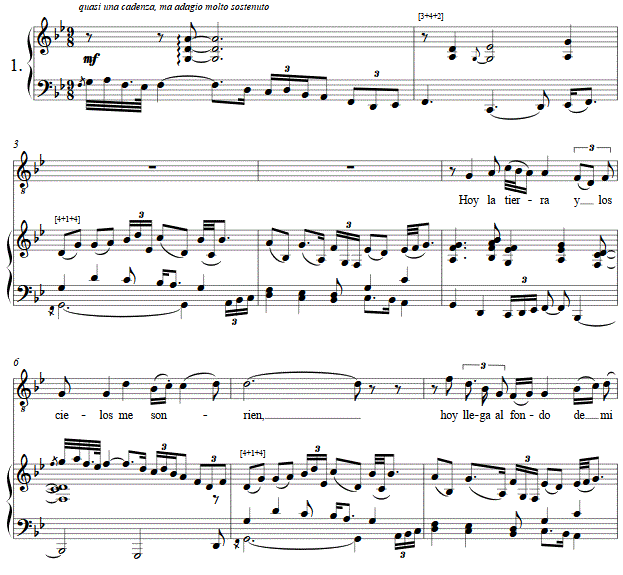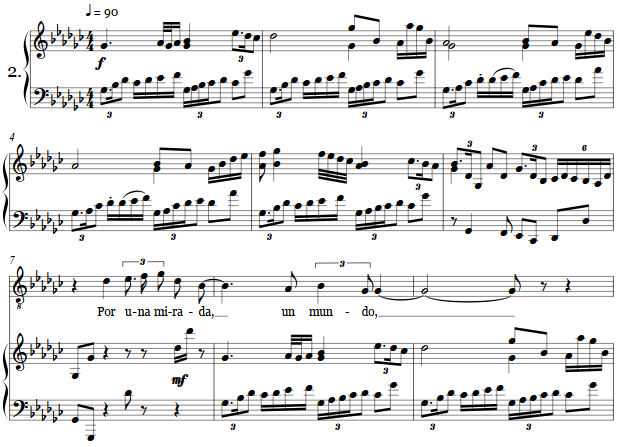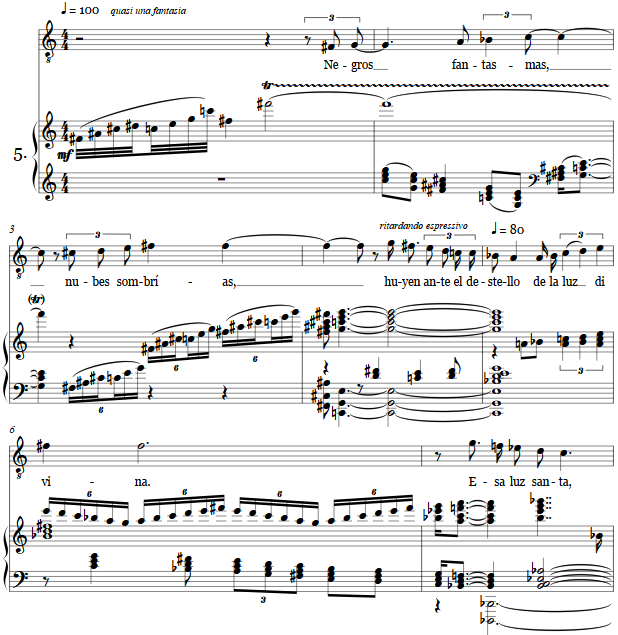Music and Texts of GARY BACHLUND
Vocal Music | Piano | Organ | Chamber Music | Orchestral | Articles and Commentary | Poems and Stories | Miscellany | FAQs
Las Canciones de Bécquer - (2001)
Gustavo Adolfo Bécquer
Five songs for tenor and piano
written for my colleague, Spanish tenor Fernando Cobo
i. Hoy creo en Dios - RIMA XVII - [ circa 3' 45" ]
Hoy la tierra y los cielos me sonríen;
hoy llega al fondo de mi alma el sol;
hoy la he visto.., la he visto y me ha mirado...
¡Hoy creo en Dios!ii. Un beso - RIMA XXIII - [ circa 1' 15" ]
Por una mirada, un mundo,
por una sonrisa, un cielo,
por un beso... ¡yo no sé
que te diera por un beso!iii. Olas gigantes - RIMA LI - [ circa 2' 10" ]
Olas gigantes que os rompéis bramando
en las playas desiertas y remotas,
envuelto entre la sábana de espumas,
¡llevadme con vosotras!
Ráfagas de huracán que arrebatáis
del alto bosque las marchitas hojas,
arrastrado en el ciego torbellino,
¡llevadme con vosotras!
Nubes de tempestad que rompe el rayo
y en fuego encienden las sangrientas orlas,
arrebatado entre la niebla oscura,
¡llevadme con vosotras!
Llevadme por piedad a donde el vértigo
con la razón me arranque la memoria.
¡Por piedad!, ¡tengo miedo de quedarme
con mi dolor a solas!iv. ¡Qué hermoso! - RIMA LXVII - [ circa 2' 20" ]
¡Qué hermoso es ver el día
coronado de fuego levantarse,
y a su beso de lumbre
brillar las olas y encenderse el aire!
¡Qué hermoso es tras la lluvia
del triste otoño en la azulada tarde,
de las húmedas flores
el perfume beber hasta saciarse!
¡Qué hermoso es cuando en copos
la blanca nieve silenciosa cae,
de las inquietas llamas
ver las rojizas lenguas agitarse!
¡Qué hermoso es cuando hay sueño
dormir bien... y roncar como un sochantre...
y comer... y engordar... y qué desgracia
que esto solo no baste!v. La luz divina - RIMA LXXXIX - [ circa 3' 00" ]
Negros fantasmas,
nubes sombrías,
huyen ante el destello
de la luz divina.
Esa luz santa,
niña de negros ojos,
es la esperanza.
Al calor de sus rayos
mi fe gigante
contra desdenes lucha
sin amenguarse.
en este empeño
es, si grande el martirio,
mayor el premio.
Y si aún muestras esquiva
alma de nieve,
si aún no me quisieras,
yo no he de quererte:
mi amor es roca
donde se estrellan tímidas
del mal las olas.Total duration [ circa 12' 30" ]
Gustavo Adolfo Bécquer
Gustavo Adolfo Bécquer(17 February 1836, Sevilla - 22 December 1870, Madrid) Born in Seville and from Spanish and Flemish ancestry, Bécquer was a poet and writer of romantic tales. His work is considered to be among the best 19th-century lyric poetry. Orphaned at 10, unhappy in love and marriage, and living in relative poverty for most of his brief life, he came to be lonely and introspective. Apparently Bécquer could have inherited his godmother’s fortune had he been willing to take up a mercantile career, but business life was at odds with his artistic conscience. At the age of seventeen and a half, he uprooted himself and set off for Madrid to devote himself to the precarious life of literature. He arrived in the autumn of 1854 “with empty pockets,” as his biographer Ramon Rodriguez Correa was to write, “but with a head full of treasures that were not, alas, to enrich him.”
His celebrated Rimas (1860), from which five texts are drawn for this song cycle, is a suite of poems characterized by the melancholy and resigned bitterness of the romantics. His finest prose works include the tale Los ojos verdes (The green eyes), a collection of legends, Leyendas (1860–64), and a group of literary letters, Desde mi celda (From my cell) (1864). Bécquer died of pneumonia and hepatitis at the age of thirty-five.
Some translators of Bécquer's works: Owen Innsly (1882) A. Williams & Company, Jules Renard (1908) Richard G. Badger, and H. Landman. The translations below are the composer's.i. Today I believe in God!
Today the earth and the heavens smile on me;
today the sun rises from the bottom of my soul;
today I saw her.., I saw her and she glanced at me...
Today I believe in God!
ii. A Kiss
For one look, the world,
for one smile, the sky,
for one kiss...I don't know
what to give for one kiss!
iii. Giant waves
Giant waves that break with a roar
on beaches, deserted and remote,
wrapped between foamy savannahs,
carry me off with you!
Hurricane gusts which snatch up
the old woods' withered leaves,
wretched in the blind whirlwind,
carry me off with you!Tempest clouds broken into shafts of light
and bloody borders in burning light ,
wild between dense fogs,
carry me off with you!Take me for mercy's sake to where vertigo
extinguishes memory with reason.
For pity's sake, take me for I fearto be alone with pain!
iv. How Lovely
How lovely it is to see the day
crowned with a rising fire,
and from your burning kiss
shine the waves and kindling of the air!
How lovely it is after the rain
of a sad autumn in the still blue evening,
and of the tongues of flowers
to drink in the perfume until filled!
How lovely it is when the flakes
of the white snow fall into silence,
and when worried flames
see reddish tongues tossed about.
How lovely it is to dream
and to sleep well... and to snore like a singer...
and to eat... and to fatten... and how sadly
then to be alone no more!
v. Divine Light
Black phantoms,
dark clouds,
flee before the sparks
of divine light.
It is the sacred light,
black eyed girl,
it is hope.By the heat of its rays
my great faith
contends against scorn
without diminishing itself.In its determination,
even when great in torment,
greater is the prize.
And if still an exampleeludes the snow's soul,
if still you do not love me,
my love remains a rock
where only timidly break
the worst of waves.
Although Bécquer’s genius was recognized by contemporaries, his greatest fame has been posthumous. In England the novelist Mrs. Humphrey Ward whom G. K. Chesterton so often made fun of in his own poetry, writing for Macmillan’s Magazine in 1883, went so far as to declare him the only Spanish poet of the period worth translating.
Among Hispanic writers Bécquer’s influence has been pronounced on Ruben Dario, Miguel de Unamuno, and particularly on the imagist poet Juan Ramon Jiminez, who did much to revive his reputation. He remains, according to Everett Ward Olmstead, “one of the most original and charming authors of the Spanish Romantic school.”
The opening song setting is a 9/8 which is not a consistent triple rhythm, but rather a notated "improviso." It is an affirmation of belief in love and therefore God, by whom love is revealed. This is not the "agape" love of the ascetic, for Bécquer wants us to see that love is carnal alongside the eternal.
Carnal love is not just sexual, but infectiously romantic in its other manifestations, and the bold, bubbling enthusiasm of Bécquer's text tries to assign some value to a kiss -- and fails. This musical setting is therefore one grand question mark.
The dark, roiling song of roaring waves revolves around octatonic harmonies, and is juxtaposed against the next song setting, up tempo and ironic. The final setting speaks of "divine light" with a bold opening rhetoric, and then breaks into a long-lined and passionate melodic reverie, which concludes against the darker image of the third song's "giant waves" that they will "only timidly break" upon the rock which in truth is love.
[ 21 pages, circa 12' 15" ]
The score is available as a free PDF download, though any major commercial performance or recording of the work is prohibited without prior arrangement with the composer. Click on the graphic below for this choral score.



